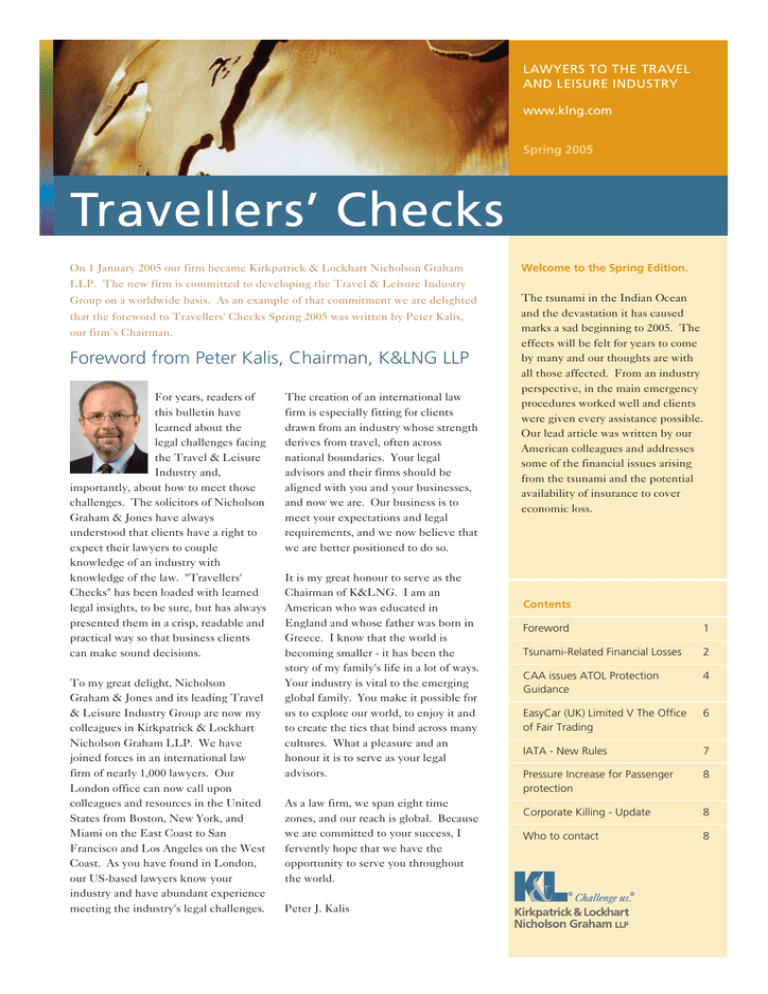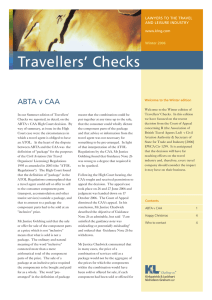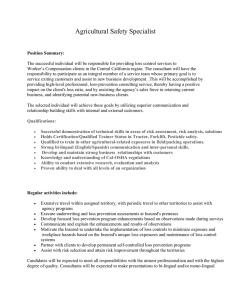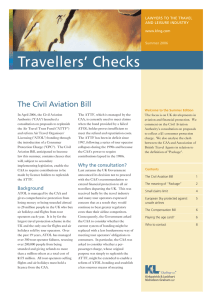
LAWYERS TO THE TRAVEL
AND LEISURE INDUSTRY
www.klng.com
Spring 2005
Travellers’ Checks
On 1 January 2005 our firm became Kirkpatrick & Lockhart Nicholson Graham
Welcome to the Spring Edition.
LLP. The new firm is committed to developing the Travel & Leisure Industry
Group on a worldwide basis. As an example of that commitment we are delighted
that the foreword to Travellers' Checks Spring 2005 was written by Peter Kalis,
our firm’s Chairman.
Foreword from Peter Kalis, Chairman, K&LNG LLP
For years, readers of
this bulletin have
learned about the
legal challenges facing
the Travel & Leisure
Industry and,
importantly, about how to meet those
challenges. The solicitors of Nicholson
Graham & Jones have always
understood that clients have a right to
expect their lawyers to couple
knowledge of an industry with
knowledge of the law. "Travellers'
Checks" has been loaded with learned
legal insights, to be sure, but has always
presented them in a crisp, readable and
practical way so that business clients
can make sound decisions.
To my great delight, Nicholson
Graham & Jones and its leading Travel
& Leisure Industry Group are now my
colleagues in Kirkpatrick & Lockhart
Nicholson Graham LLP. We have
joined forces in an international law
firm of nearly 1,000 lawyers. Our
London office can now call upon
colleagues and resources in the United
States from Boston, New York, and
Miami on the East Coast to San
Francisco and Los Angeles on the West
Coast. As you have found in London,
our US-based lawyers know your
industry and have abundant experience
meeting the industry's legal challenges.
The creation of an international law
firm is especially fitting for clients
drawn from an industry whose strength
derives from travel, often across
national boundaries. Your legal
advisors and their firms should be
aligned with you and your businesses,
and now we are. Our business is to
meet your expectations and legal
requirements, and we now believe that
we are better positioned to do so.
It is my great honour to serve as the
Chairman of K&LNG. I am an
American who was educated in
England and whose father was born in
Greece. I know that the world is
becoming smaller - it has been the
story of my family's life in a lot of ways.
Your industry is vital to the emerging
global family. You make it possible for
us to explore our world, to enjoy it and
to create the ties that bind across many
cultures. What a pleasure and an
honour it is to serve as your legal
advisors.
As a law firm, we span eight time
zones, and our reach is global. Because
we are committed to your success, I
fervently hope that we have the
opportunity to serve you throughout
the world.
Peter J. Kalis
The tsunami in the Indian Ocean
and the devastation it has caused
marks a sad beginning to 2005. The
effects will be felt for years to come
by many and our thoughts are with
all those affected. From an industry
perspective, in the main emergency
procedures worked well and clients
were given every assistance possible.
Our lead article was written by our
American colleagues and addresses
some of the financial issues arising
from the tsunami and the potential
availability of insurance to cover
economic loss.
Contents
Foreword
1
Tsunami-Related Financial Losses
2
CAA issues ATOL Protection
Guidance
4
EasyCar (UK) Limited V The Office
of Fair Trading
6
IATA - New Rules
7
Pressure Increase for Passenger
protection
8
Corporate Killing - Update
8
Who to contact
8
Travellers’ Checks
Tsunami-Related Financial Losses:
Checklist of selected Insurance Coverage Considerations
The tsunami that swept through the
Indian Ocean on December 26th has
caused widespread loss of life, suffering
and damage to livelihood. Our
sympathies are extended to all those
affected.
Among the hardest hit businesses are
the hotels and resorts located
throughout the region and for many the
financial impact will be felt for years.
Given these significant financial losses,
affected businesses should consider the
availability of insurance, and in
particular the role of business
interruption insurance. Many hotels
and resorts, particularly those owned by
companies that operate properties
throughout the world, are likely to have
broadly-worded policies that cover the
types of business interruption losses
arising from the tsunami disaster.
We thought it would be helpful to
highlight the steps that businesses can
take to protect themselves against
economic damage. The following
checklist of business interruption
considerations is a general overview of
selected issues that are relevant to such
claims:
Identifying Possible Coverage
Business interruption coverage
typically is included as part of firstparty property insurance, covering the
assets of the insured entity and is often
broadly written. Business interruption
coverage generally covers the insured's
loss of earnings or revenue resulting
from property damage caused by an
insured peril. Such coverage also often
includes:
2
SPRING 2005
"extra expense" coverage, which
generally promises coverage for
certain extra expenses the insured
incurred as a result of an insured
event.
"civil authority" coverage, which
generally promises coverage for
losses arising from an order of a
governmental authority that
interferes with normal business
operations.
"defence" coverage, which generally
promises coverage for defence costs
incurred with respect to claims
alleging that the insured is
responsible for damage to covered
property of others.
"ingress and egress" coverage, which
generally promises coverage when
access to a business premises is
blocked for a time.
"service interruption" cover, which
generally promises coverage when
electric or other power supplies and
services are interrupted.
"claim preparation" coverage, which
generally promises coverage for the
costs associated with compiling and
certifying a claim.
Presenting a Claim
Most policies identify specific
procedures that should be followed in
presenting a business interruption
claim (notice, proof of loss etc.) and
some of these procedures may have
timing deadlines associated with them.
Accordingly, an insured experiencing a
loss potentially covered by a business
www.klng.com
property damage.
interruption policy should promptly:
collect its loss information;
evaluate the information in light of
the policy wording; and
Many first-party property policies are
written on a "all risk" basis, meaning
that virtually any cause of property
damage is within the scope of the
policy, except for those that are
stated in the exclusions. Sometimes
policies contain particular provisions
promising coverage for particular
events (including orders of civil
authority). Accordingly, although
some policies may expressly exclude
damage caused by "floods", some
broadly worded policies may provide
avenues to coverage through, for
example, "civil authority" and
"ingress/egress" coverage. There
could also be disputes about whether
the damage was a result of
"earthquake" or "earth movement",
which may or may not be covered
under certain first-party policies.
present it to the insurer in a timely
and coverage-promoting manner.
It is sometimes advisable to retain
forensic accountants to assist in
preparing and certifying a claim, since
the costs associated with such an effort
are often covered. If purported
deadlines have passed, the insured's
pursuit of an insurance claim is not
necessarily foreclosed. The insurer
may have to show it was prejudiced by
an insured's failure to meet a timing
deadline before coverage will be
forfeited on this basis.
Common Insurer Responses
Insurers may raise any number of issues
in response to a business interruption
claim:
Did an "interruption" of business
result?
Generally there may be a claim any
time an insured's income is adversely
affected by an insured event.
Was the interruption necessary?
Did the alleged loss of income or
extra expense arise out of damage to
"insured property"?
It is not always necessary that the
relevant "property damage" occurred
to property belonging to the insured.
Many policies explicitly or implicitly
also promise coverage when a
supplier or, depending on the policy
language, any other entity incurs
property damage that results in an
interruption of the insured's
business. This is sometimes known
as "contingent business interruption"
coverage and is often very broad.
Similarly, there may be arguments
for coverage where travel
cancellations were due to civil
disorders, inaccessible roads and
closed airports, as opposed to
Was the damage to insured property
caused by an "insured peril"?
The insured could question whether
the claimed interruption is the result
of a routine business decision as
opposed to a "necessary" interruption
under the circumstances.
Does the loss meet requirements the
policy may have regarding duration
of the interruption?
Some policies have language limiting
coverage to interruptions that extend
for longer than a specified period of
time. An insured should consider
whether any such time frame
specified in its policy is appropriate
in light of its business.
How long is the allowed "recovery
period"?
Policies sometimes include
provisions specifying that the policy
will only cover loss of income and
related expenses for a specified
period of time after an insured event
occurs. This time frame typically
should be tied to the time it would
take the insured, employing
reasonable mitigation efforts, to
resume normal business operations
under the circumstances.
How many "occurrences" are
implicated by the alleged loss?
Many policies have "per occurrence"
deductibles or other self-insurance
features that may reduce the amount
of coverage available depending on
how the "number of occurrences"
issue is addressed. The issue can
also impact the amount of perSPRING 2005
3
Travellers’ Checks
occurrence policy limits that may be
available to the insured.
In the case of a claim resulting from
loss of income or extra expenses
associated with the loss of electrical
power or other services, did the
interruption result from damage by
an insured peril to property of the
provider of the service?
Some policies purport to exclude
business interruption coverage
arising from interruptions in
electrical service (assuming the
interruption is the controlling "cause"
of the loss). Other policies have
language explicitly promising time
element coverage for losses arising
out of service interruptions but
purport to require that the
interruption resulted from damage to
property of the service provider. In
such a case, the circumstances and
cause of the interruption, including
whether the circumstances and cause
can be classified as resulting from
damage to property of the service
provider, may be critical to the
availability of coverage. Policy
language in this context varies
considerably and an insured must
review carefully its own policy to
assess the availability of time
element coverage arising out of
service interruption.
Evaluating and Challenging Insurer
Positions
The validity of any defences to
coverage raised by insurers may well
vary from country to country, due to
different courts' approaches to coverage
issues presented by business
interruption claims. It is not always
clear which country's law will apply to a
coverage dispute in the absence of a
specific choice-of-law provision.
Furthermore, the applicability of these
4
SPRING 2005
potential defences will depend a great
deal on the specific language used in
the policy. Sometimes insurers seek to
limit the insured's right to challenge an
insurers coverage determination in
court by specifying an appraisal and
arbitration procedure in the policy.
Our thanks to James R. Segerdahl and
Heath B. Monesmith of the Pittsburgh
office for writing this article.
CAA issues ATOL Protection
Guidance
On 4 March 2005 the Civil Aviation
Authority ("CAA") published new
consumer protection guidelines ("CAA
Guidance") for travel agents who put
together and sell "dynamic packages" or
"split contracts".
There has been an explosion in the
number of travel agents offering their
own packages rather than booking their
customers with licensed tour operators.
Many of these agent-constructed
packages are not financially protected
and this will now change. The CAA
Guidance makes it clear that in the
majority of cases these sales need to be
protected by an Air Travel Organisers'
Licence ("ATOL") to comply with the
Package Travel, Package Holidays and
Package Tours Regulations ("the
Package Travel Regulations"). As a
consequence some travel firms will
need to apply for licences for the first
time, whilst some existing ATOL
holders will need to increase the size of
their bonded licence authorisations.
The CAA Guidance has been issued to
clarify the change in the ATOL
Regulations in Autumn 2003, which
followed an industry wide consultation
on the application and scope of revised
ATOL Regulations. The revised
Regulations incorporated the definition
of a package used in the Package
Travel Regulations which derives from
the EC Directive on package travel,
package holidays and package tours.
The Package Travel Regulations
define a "package" as:
"Package means the prearranged
combination of at least two of the
following components when sold or
offered for sale at an inclusive price and
when the service covers a period of
more than 24 hours or includes
overnight accommodation:
a) transport;
b) accommodation;
c) other tourist services not ancillary to
transport and accommodation and
i) submission of separate accounts for
different components shall not cause
the arrangements to be other than a
package;
ii) the fact that the combination is
arranged at the request of the
consumer and in accordance with his
specific instructions whether
modified or not shall not of itself
cause it to be treated as other than
pre-arranged."
In 2003, many split-package sales were
caught by the definition of "package"
and needed to provide financial
protection. However, with rapid
changes in travel sales methods it
www.klng.com
became clear that more detailed
guidance was needed for travel agents.
The question of whether an ATOL is
required for any individual transaction
will depend upon the particular facts
of the transaction. However, the CAA's
Guidance gives the following examples
of situations where an ATOL would be
required:
A travel agent sells an ATOL
package, but if the ATOL holder's
documentation is not provided to the
customer, then the agent will be
seen as the contracting party and will
need their own ATOL. A similar
position will occur if an agent marks
up the ATOL holder's sale price and
documents the transaction as his
own.
If travel facilities are advertised by
an agent in a brochure, a shop
window display, on Teletext, in a
newspaper advertisement or on a
website, and it is clear that these can
be combined to form a package, or
the agent offers to provide individual
package quotations based on an
advertised range of options, then
such packages require ATOL cover.
However if these facilities were
offered and sold by the agent on
behalf of a single ATOL holding
tour operator, then the agent would
not need its own ATOL.
If an agent offers a customer a choice
of travel facilities, including a flight,
their resulting sale will be a package
requiring the agent to hold an
ATOL. However, this will not be
the case where the travel facilities in
question all form part of a package
sold by the travel agent on behalf of
a single ATOL holder.
If a customer requests a flight and
accommodation and/or other tourist
services to a particular resort or
destination and asks an agent for
details of suitable arrangements and
the agent provides information on a
combination of services, rather than a
package from an ATOL holder, then
this is a package under the PTR and
the agent will need to hold an
ATOL.
In some instances, a customer may
have been offered an ATOL
protected package, but asks the
agent whether there is a cheaper
alternative; if the agent decides to
offer an alternative that he has
selected himself, rather than a
package from another ATOL holder,
then the agent will need his own
ATOL.
Following the 2003 ATOL
Regulations amendment, if an agent
puts together a package utilising a
scheduled flight, provided to the
customer on a "ticket provider" basis,
(i.e. the customer paid for the flight
and received a valid ticket for travel
immediately in return), then the
package will require to be covered
by an ATOL.
If an agent advertises that he can
provide tailor-made holiday
arrangements or he can provide
dynamic packages, then he will need
an ATOL to cover the majority of
such sales. However if all the
facilities were offered and sold by
the agent on behalf of a single
ATOL holder, an ATOL would not
be required.
If an agent has taken commitments
or contracts with a supplier for any
item offered as part of an air
package, then the package will
require ATOL cover.
In summary the CAA's Guidance
advises that travel firms which sell air
package arrangements which they have
constructed themselves will, in the
majority of cases, need to hold an
ATOL to protect these sales. From the
agent's perspective this means that if
they have selected specific travel
components, or they offered for sale
travel facilities including a flight, then
the resultant sale will usually be a
package and needs to be protected
financially.
SPRING 2005
5
Travellers’ Checks
package arrangements which they
Easycar (UK) Limited v the Office Fair
Trading
have constructed themselves will,
Are car hire contracts subject to the distance selling regulations?
“... travel firms which sell air
in the majority of cases, need to
hold an ATOL...”
Travel agents who are therefore selling
package arrangements now have a
number of options open to them:
They can offer air packages as retail
agents of ATOL holders, including
the new and growing number of
dynamic packaging systems
marketed to agents by ATOL
holders. This option has the added
re-assurance that an ATOL holder
takes overall responsibility for the
complete package and its
performance; or
They can get their own ATOL and
put together their own packages
using different suppliers, and take
overall responsibility for these sales;
or
They can continue retailing
packages for tour operators in the
traditional manner."
The CAA is to carry out increased
monitoring of agents to ensure they are
complying with the revised ATOL
Regulations. Failure to comply is a
criminal offence. The maximum
penalty on summary conviction is
£5,000 and on conviction on indictment
to a fine or imprisonment for a term not
exceeding two years or both.
The new rules are expected to come
into force by early summer and we will
be reporting on them.
6
SPRING 2005
EasyCar carries on business exclusively
over the internet. Its terms and
conditions give customers a right to
cancel once they have booked, but
without any right to a refund save in
the event of unforeseeable or otherwise
exceptional circumstances, such as
serous illness or disaster.
Following various consumer
complaints, the UK's Office of Fair
Trading (OFT) issued a claim against
easyCar seeking an injunction to
require it to comply with the Consumer
Protection (Distance Selling)
Regulations 2000 (the "Regulations")
which aim to protect consumers who
enter into contracts other than face to
face with the supplier. The
Regulations provide that having
entered into such contracts, consumers
must have seven working days to
change their mind without any penalty
being incurred. However the
Regulations also provide that this right
does not apply to, "contracts for the
provision of …, transport, …… services,
where the supplier undertakes, when
the contract is concluded, to provide
these services on a specific date or
within a specific period".
The OFT's claim has now been
referred to the European Court for an
assessment of the European Directive
on which the Regulations are based.
The issue at stake being whether the
hiring out of cars can be described as
the provision of a transport service.
The Advocate General of the European
Court compared the losses that would
be suffered by easyCar in comparison
with other providers of accommodation,
transport and leisure services. The
main consequence for easyCar would
be that one of its cars might remain in
the car hire pool (still available for
other consumers) whereas losses for
hoteliers or passenger transport
companies would tend to include
wasted employee time and a greater
difficulty in re-selling the capacity.
www.klng.com
This argument was strengthened by
the fact that in the case of easyCar,
consumers paid a supplement if they
wished the car to be cleaned and/or
filled with fuel - in the event of a
cancellation, no such investment would
have been made.
Since under EC law any exception to a
consumer protection measure should
be narrowly interpreted, it followed
that according to the Advocate General,
it was not appropriate to regard car hire
as a transport service and accordingly
consumers of such services would be
entitled to benefit from the seven day
"cooling off" period under the
Regulations.
Comment
It remains to be seen if the Court will
agree with the AG's Opinion. It is
likely that it will, given the Court's
general preference to give consumers
the maximum benefit of EC legislation.
The case will have implications for
other car hire operators who may have
used similarly worded terms and
conditions with their customers.
IATA - New Rules
The international body which regulates
air fares, IATA, has decided that travel
agents in one country will be allowed to
issue tickets in another. IATA is
removing restrictions that forbid travel
agents in one country issuing tickets in
another if that means savings for their
clients. These new relaxed rules
should reduce air fares and plane
tickets are expected to become
substantially cheaper. In many cases,
buying two single tickets to and from
one destination will be cheaper than a
return ticket.
The liberalisation of the rules, which
should knock several hundred pounds
off the price of many tickets, has been
prompted by the growing volume of
ticket sales on the internet.
IATA has acknowledged that in the
internet age, identifying the country in
which customers book their tickets
online is almost impossible. It has
therefore decided that air fares should
no longer be based on the country of
sale.
“... it was not appropriate to
regard car hire as a transport
Until now, travel agents in one country
could not issue tickets in another, even
though that would have meant savings
for their customers, simply because
people usually pay less for tickets
issued in their own countries. To
ensure that passengers would not
undercut the price of a return trip.
One-way fares from their destination
back home would never be less than
the fare in the reverse direction.
By scrapping this rule, IATA has
effectively allowed the price of a oneway business class ticket from Hong
Kong to London to fall from £2,600 to
£1,900, fare experts say. Similarly, a
business one-way ticket from Sao
Paulo, Brazil to London will drop from
£3,300 to £1,300. First-class and
business travellers will save the most,
with economy travellers not seeing
much difference. Economy class
travellers in Britain are unlikely to
benefit from a substantial drop in prices
as the holiday market is one of the
cheapest in the world, with no-frills
airlines competing for business.
Flights starting and ending in cities
outside the country where the booking
was made will become cheaper, too.
The new rules will not, however, apply
to flights to, from or via Japan.
service and consumers of such
services would be entitled to
benefit from the seven day
"cooling off" period under the
Regulations.”
SPRING 2005
7
Travellers’
Checks
Travellers’ Checks
Pressure increase for passenger protection
Following the recent collapse of the
Polish no-frills airline, Air Polonia,
operating out of Stanstead Airport, the
consumer organisation, Which?, has
joined ABTA and the Federation of
Tour Operators ("FTO") in calling for
action to be taken by the Government
to provide protection for passengers in
the event of all airline failures.
There were six airline casualties in
Europe last year - the Italian carrier,
Volare; the Dutch airline, V-Bird; Jet
Magic from Ireland; and the UK
carriers, Duo and Now and more
recently, Air Polonia.
At present, scheduled airlines (and this
includes low-fare carriers) do not need
to be bonded in contrast with charter
airlines and those tour operators
providing flights. The real concern
arises out of the probability that more
airlines will fail in 2005 and
holidaymakers will lose money and/or
be stranded abroad.
scheme be extended to cover all air
travellers and a MORI poll undertaken
at the request of the FTO and ABTA
concluded that 81% of consumers
would agree to pay an additional sum of
between 50p and £2 to the cost of
airline ticket to protect themselves
against failure.
The Department of Transport is
currently seeking to encourage airlines
to voluntarily implement effective
interim measures to improve the
current levels of consumer protection
until new arrangements can be agreed
and formally put into place. There
appears to be support that the Air
Travel Organisers Licence (ATOL)
We understand that the Government
has given an indication that new rules
should be in place by the end of 2005.
The general view is that this is long
overdue and that adequate voluntary
measures must be put into effect
urgently, and certainly before Summer
2005, as other airline failures seem
likely.
Corporate Killing - Update
In our Autumn 2004 edition of
Travellers Checks we wrote about the
Government's plans to introduce a new
offence of corporate killing. However,
the Government has recently said it
would only publish the bill in draft,
meaning it has no commitment to turn
it into law. Therefore, uncertainty
remains as to if and when the
Government will introduce the offence
of corporate killing.
The proposed reforms are part of a
drive to modernise the criminal justice
system. The offence of "corporate
killing" will make it easier to prosecute
a company, or other employing
organisation, for a homicide offence.
Under current laws, the outcome of the
case depends on whether or not a
director or senior manager of a
company can be found liable for
manslaughter. This requires evidence
of "gross negligence" and without that
Who to Contact
there is no case against a company.
At present, unless a senior manager can
be found guilty of manslaughter a
company cannot be convicted. The
new draft proposals are designed to
make the "controlling mind" of the
company accountable for manslaughter,
by focusing on potentially wider
management failings within an
organisation.
Kirkpatrick & Lockhart
For further information contact
Nicholson Graham LLP
Cynthia Barbor
cbarbor@klng.com
110 Cannon Street
T: +44 (0)20 7360 8170
London EC4N 6AR
www.klng.com
Laura Harcombe
lharcombe@klng.com
T: +44 (0)20 7648 9000
T: +44 (0)20 7360 8186
F: +44 (0)20 7648 9001
Kirkpatrick & Lockhart Nicholson Graham is a combination of two limited liability partnerships, each named Kirkpatrick & Lockhart Nicholson Graham LLP,
one established in Delaware, USA, and one incorporated in England.
This publication/newsletter is for informational purposes and does not contain or convey legal advice. The information herein should not be used or relied
upon in regard to any particular facts or circumstances without first consulting a lawyer.
Unless otherwise indicated, the lawyers are not certified by the Texas Board of Legal Specialization.
Data Protection Act 1998 - We may contact you from time to time with information on Kirkpatrick & Lockhart Nicholson
Graham LLP seminars and with our regular newsletters, which may be of interest to you. We will not provide your details
to any third parties. Please e-mail cgregory@klng.com if you would prefer not to receive this information.
8
SPRING 2005
© 2005 KIRKPATRICK & LOCKHART NICHOLSON GRAHAM LLP. ALL RIGHTS RESERVED.






